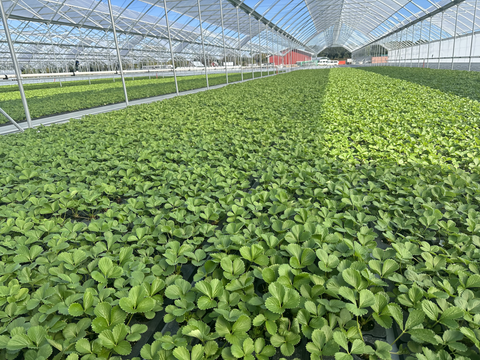Nourse Farms Grows Differently, Mitigating Risks Through Smart Growing Practices
In August, news broke in the strawberry-growing industry that there was a large outbreak of Neopestalotiopsis (Neo-P), an emerging strawberry fungal disease affecting every part of the plant (crown, roots, leaves, fruit). This has impacted thousands of growers across North America, causing shipments to be canceled and many growers to abandon strawberry-growing plans this season.
In 2023, Nourse Farms, a North American berry plant propagator, had the foresight to invest in innovative propagation techniques that help mitigate risks such as Neo-P while enhancing overall plant quality.
“It starts with our virus-indexed tissue culture mother plants, which has been a hallmark of our organization for decades,” said John Place, Nourse Farms CEO. “In the past year, we’ve expanded our propagation systems to shield our plants from weather-related stress and reduce disease pressures. Our stringent quality control processes are designed to ensure our plants are in the best position to meet the highest standards of cleanliness and health. Our advanced systems promote superior root development, increased airflow around the plants, and stronger, healthier plants that are ready to thrive once they reach our customers.”

Nourse Farms’ North Carolina glasshouse (pictured above) is used primarily for strawberry tip production.
“We believe the strawberry plants should be grown in a controlled environment,” said Place. “By growing our tips in a high-tech glasshouse, we keep the mother plants clean and, therefore, keep the runner tips clean. Growing in a controlled environment also allows for earlier tip production which ultimately means earlier plant deliveries to customers.”
Enhanced Plant Quality Through Raised Rail Systems
Nourse Farms’ adoption of the GeGe rail tray system protected by Haygrove tunnels at their Massachusetts and North Carolina facilities is a game-changer for plant quality. This set up covers four acres in Massachusetts and 13 acres in North Carolina, significantly improving airflow around the plants, encouraging better root development, and resulting in sturdier, more vigorous plants. The controlled environment of the rail trays paired with the tunnels reduces the risk of soil contact and water splashing, protecting the plants from disease exposure and ensuring they arrive at customers' fields ready to perform. This setup, the first of its kind in the world, embodies Nourse Farms’ commitment to innovation and excellence in plant propagation.
Expanding the Genetic Horizon and Lab Capabilities
A key component of Nourse Farms’ success is its ability to source superior strawberry genetics from around the globe, bringing the highest-quality options to North American growers. This global approach ensures that Nourse Farms’ customers have access to a diverse range of high-performing varieties suited to different climates and conditions.
Central to this effort is Nourse Farms' newly expanded lab, which plays a critical role in maintaining clean mother plants, as the cornerstone of their operations. The state-of-the-art facility supports rigorous plant health standards, from initial virus indexing through tissue culture and into propagation systems. This commitment to clean stock ensures that Nourse Farms’ plants start strong and stay strong.
Controlling Every Step from Lab to Field
Nourse Farms’ unique process allows the organization to maintain control over every stage of plant production. This holistic approach enables Nourse Farms to respond swiftly to industry challenges, innovate continuously, and deliver exceptional quality plants that meet the evolving needs of growers.
“With unpredictable weather patterns and emerging disease pressures, we recognized the need to control our entire propagation process,” said Place. “While there’s no cure-all to eliminate all of the risks that we face as an industry, our integrated approach means we’re not just reacting to challenges; we’re leading the way in overcoming them, ensuring that our customers receive the highest-quality plants that are ready to get to work in their fields.”




